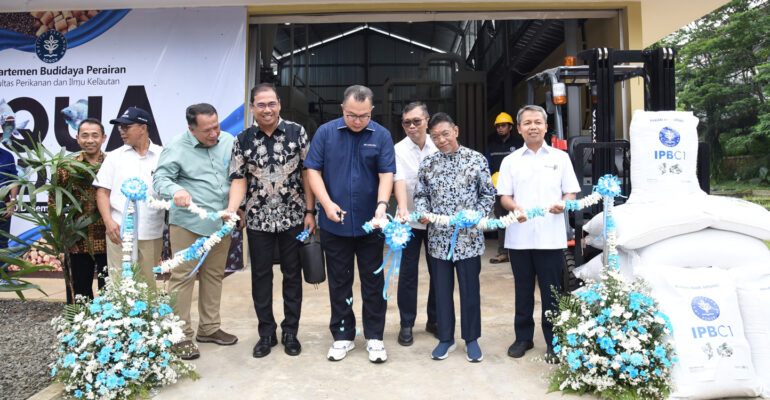IPB University Inaugurates Excellent Facilities to Support Education, Research, and Innovation

Rector of IPB University, Prof Arif Satria inaugurated various excellent facilities at IPB University Campus, Bogor (30/12). The new facilities are Co-Creation Lounge, Aqua Feed Mill, Teaching Feed Industry, Student Hall of Veterinary and Biomedical School, Joint Laboratory (Isotope) and IPB BioVet Science.
At the same time, the groundbreaking of Halal Business Incubator Building located in Science Techno Park (STP), IPB Taman Kencana Campus was also conducted.
Prof Arif Satria said that this inauguration is a big commitment of IPB University in presenting various excellent facilities in order to support education, research, and innovation. He called this step an important effort to increase the capacity of various facilities at IPB University.
“This effort is also continuously made to improve the quality of the best service for students. This commitment reflects the strategic role of IPB University in advancing higher education and contributing to sustainable development in Indonesia,” said Prof Arif.
The following are various facilities inaugurated by IPB University:
1. Co-Creation Lounge Reading Room, IPB Library
This facility is a more dynamic and flexible learning space area to support the search for knowledge. Currently, the number of visitors to the IPB University library reaches around 600-1.000 visitors per day.
The Co-Creation Lounge is expected to complement the facilities at IPB University Library to support the creation of a more productive learning atmosphere for all visitors.
2. Aqua Feed Mill, Faculty of Fisheries and Marine Science (FPIK)
This fish feed mill was built in the pond area of the Department of Aquaculture FPIK with an area of 9,1 m x 19,52 m machine room and 4 m x 4,55 m boiler room. The facility is equipped with an extruder to produce floating feed and is designed for various types of aquaculture feed, especially for freshwater fish.
The Aqua Feed Mill has a production capacity of 350 kg per hour and a projected production of up to 30 tons per month under fully operational conditions. In addition, this fish feed mill is a competitive advantage for IPB University in establishing collaboration with various stakeholders in the field of aquaculture.
3. Teaching Feed Industry, Faculty of Animal Science
An integrated animal feed factory, the Teaching Feed Industry was built through the Inter-University Center of Excellence (PUAPT) program. This factory includes various stages of feed production starting from the process of grinding (grinder), mixing (mixer), pellet formation (pelletizer), extrusion (extruder), conditioning, crushing pellets into smaller shapes (crumbler), to packaging (packaging).
The plant is able to optimally produce various types of animal feed, including feed for beef cattle, dairy cattle, sheep, goats, chickens, and feed for pets. Teaching Feed Industry also supports research activities, business development, and strategic programs in the field of food security.
4. Student Hall, Isotope and IPB BioVet Science
Other facilities inaugurated were the Student Hall, Joint Laboratory (Isotope) and IPB BioVet Science. The facilities located in the School of Veterinary Medicine and Biomedicine (SKHB) were established through funding for Institutional and Facility Development Fees (BPIF). Not only that, various supporting tools for the laboratory are also equipped to support academic and research activities of the community.
5. Groundbreaking of Halal Business Incubator Building, STP IPB
In addition to the inauguration of new facilities, Rector Prof Arif Satria also conducted the groundbreaking of the Halal Business Incubator (IBH) building. This facility is part of the Promoting Research and Innovation Through Modern and Efficient and Technology Parks Project (PRIME STeP) program – STP IPB University with a total asset value of Rp145,90 billion.
The building consists of five floors and one semi-basement, equipped with a Communal Wastewater Treatment Plant (IPAL) to ensure sustainable waste management.
IBH will serve as a center for innovation and business development of halal products, and provide various supporting facilities, such as halal product testing laboratories, including Biosafety Level 3 (BSL3) and Dioxin Laboratories, halal certification services and halal product assurance system training. (dr/Rz) (IAAS/RUM)



